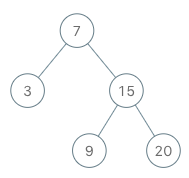Binary Search Tree Iterator
Description
Implement an iterator over a binary search tree (BST). Your iterator will be initialized with the root node of a BST.
Calling next() will return the next smallest number in the BST.
Example:

BSTIterator iterator = new BSTIterator(root); iterator.next(); // return 3 iterator.next(); // return 7 iterator.hasNext(); // return true iterator.next(); // return 9 iterator.hasNext(); // return true iterator.next(); // return 15 iterator.hasNext(); // return true iterator.next(); // return 20 iterator.hasNext(); // return false
Note:
next()andhasNext()should run in average O(1) time and uses O(h) memory, where h is the height of the tree.- You may assume that
next()call will always be valid, that is, there will be at least a next smallest number in the BST whennext()is called.
Solution(javascript)
// // 1: Recursion
// const BSTIterator = function (root) {
// const inOrderTraverse = (node) => {
// if (node) {
// inOrderTraverse(node.right)
// this.list.push(node.val)
// inOrderTraverse(node.left)
// }
// }
// this.list = []
// inOrderTraverse(root)
// }
// /**
// * @return 下一个最小的数 * @return {number}
// */
// BSTIterator.prototype.next = function () {
// return this.list.pop()
// }
// /**
// * @return 是否存在下一个最小的数 * @return {boolean}
// */
// BSTIterator.prototype.hasNext = function () {
// return this.list.length > 0
// }
// 2: Iterative
const BSTIterator = function (root) {
this.stack = []
this.push(root)
}
/**
* @return 下一个最小的数 * @return {number}
*/
BSTIterator.prototype.next = function () {
const node = this.stack.pop()
this.push(node.right)
return node.val
}
/**
* @return 是否存在下一个最小的数 * @return {boolean}
*/
BSTIterator.prototype.hasNext = function () {
return this.stack.length > 0
}
BSTIterator.prototype.push = function (node) {
while (node) {
this.stack.push(node)
node = node.left
}
}
